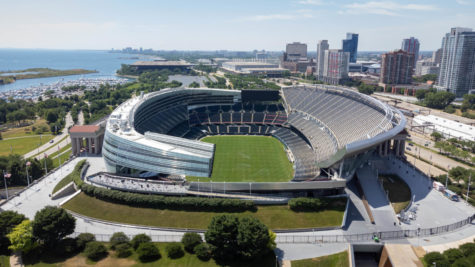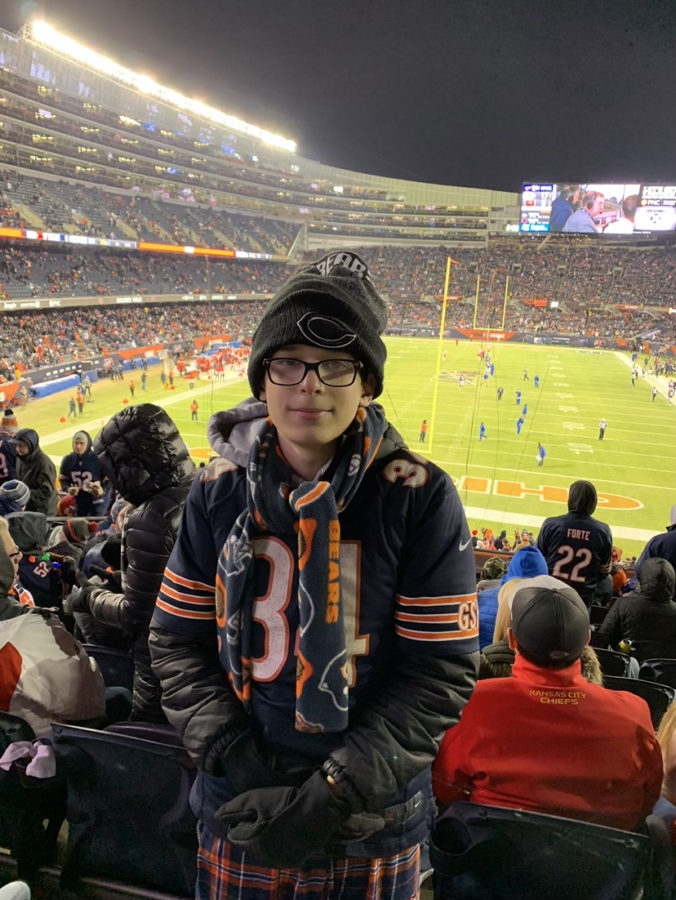Opinion | The new Chicago Bears Arlington Heights stadium will benefit Chicagoland
March 15, 2023
On Feb. 15, the Chicago Bears released a statement declaring that the team officially signed an agreement to purchase 326 acres of property in Arlington Heights. This is a clear sign that the team will be building a new stadium in Arlington and leaving their 98-year-old stadium, Soldier Field. However, the purchase came with plenty of anger from fans who wanted to keep the team in Chicago, which was a massive shock to me.
Don’t get me wrong, I have love for Soldier Field. Some of my fondest memories come from that beer-stenched arena. I still remember when my dad took my brother and I to a noon game against the Vikings on a cold November day. I remember the rush of the crowd cheering as Brandon Marshall caught a game-winning touchdown. I remember high fiving the Bears’ faithful on my way out. So, I can never truly say I hate Soldier Field.
Here’s the issue, though: all of those memories come from my love of the Bears, not my love of the stadium or its location. Soldier Field is old, uninspiring, cold, crowded and a nightmare for parking and traffic. A new stadium in Arlington Heights will improve all of these things and wouldn’t sacrifice any of the fan spirit that makes the Bears a great team to root for. Along with this, an Arlington Stadium will both financially and socially benefit the Chicagoland area.
When the Arlington Heights deal was announced, Bears fans split into two camps. Some fans were excited about the new acquisition of land, while others were upset. One reason for this anger is that some believe a team called the “Chicago Bears” will lose support if they play in an area besides Chicago. While that opinion could make sense to an outsider, most football fans understand that this is a baseless claim.
“So many teams have stadiums in places that aren’t in their name,” Matt Streicker, a junior and one of the biggest Bears fans I know, pointed out.
Currently, there are ten teams in the NFL that don’t play in the city of their namesake. Ironically enough, that list includes some of the most impassioned fan bases: the Buffalo Bills, New York Giants and Dallas Cowboys. If anything, a new stadium will raise excitement for the team and actually draw in more support for the team, just like what happened for the Cowboys when they built the massive AT&T Stadium in 2009. AT&T Stadium is 20 miles away from Dallas, yet since the stadium was built, the Cowboys have the most total attendance for home games in the NFL. So no, they won’t have to go by the “Arlington Bears,” and they won’t lose any of their Chicagoland support.

Another argument people have used is that a renovated Soldier Field would’ve been just as good as a new stadium. While trying to convince the team to stay, the City of Chicago released an image of a model for a renovated Chicago stadium, and it got many fans very excited. I will confess, the stadium itself looked cool, but that doesn’t change the countless other factors that make Soldier Field a poor place to play. The weather around the stadium would still be freezing, as the stadium is located a short walk away from the lake. The parking would still be a nightmare, with barely any space to add more parking room even after renovations. Therefore, with a cool stadium design, Soldier Field would still be seen as average at best. As we saw in 2001, Soldier Field renovations aren’t the solution.
I have already gone in depth about why moving out of Chicago is a good decision, but you might be wondering why Arlington Heights is a good location for Bears football. For starters, the stadium would be massive. To put it into perspective, the fantastic SoFi Stadium, located in Inglewood, Cali., was opened in 2020 with a total area of 298 acres. This stadium has already hosted Super Bowl 56, the 2023 College Football National Championship and is in line to host WrestleMania, the Olympics and the World Cup. Now, imagine what kind of events will take place in a 326 acre stadium located near another big city. It is important to note that SoFi stadium is located in Inglewood, not Los Angeles, yet this location hasn’t harmed its drawing power one bit. Arlington Heights will almost certainly become the sports capital of not only Illinois, but the entire midwest. Chicagoans can pretty much pencil in a Super Bowl, College Football Bowl Games, concerts and other massive events to take place in the Chicagoland area. These events in a state-of-the-art stadium will bring excitement and increased fame to an area that has recently lacked relevance.
A stadium in Arlington Heights will also help Chicago’s economy. Sure, from a pure dollar standpoint, a new stadium costs more money than a renovation, but the source of this funding is very different. When asked about the cost of stadium renovations, Lori Lightfoot—the mayor of Chicago—said “of course” to the idea that the renovations for Soldier Field would’ve been partially funded by Chicago taxes. On the other hand, The Bears have announced that there will be no tax funding for the new Arlington Heights stadium. Instead of tax dollars, a stadium in Arlington would be largely funded by the owner of the bears, Virginia McCaskey, who has an estimated net worth of $2 billion. It makes a lot more sense for a multi-billionaire to be funding a new stadium than the working class of Chicago. In addition to this, according to the Bears official Instagram account, the building of a new stadium would create 48,000 jobs and generate 9.4 billion in economic impact for the Chicagoland economy. So even to those who couldn’t care less about a football stadium, you should be excited for the new opportunity and job creation that will enter the Chicagoland area.
Overall, the Bears moving to Arlington Heights will be extremely beneficial to the Chicagoland community. More specifically, as someone from Evanston, I know a stadium in Arlington Heights would be much more convenient to get to than one in Chicago. Although it will be odd to some that the Chicago Bears don’t play in Chicago, the stadium will bring excitement, money and relevance to an area that desperately needs it.












